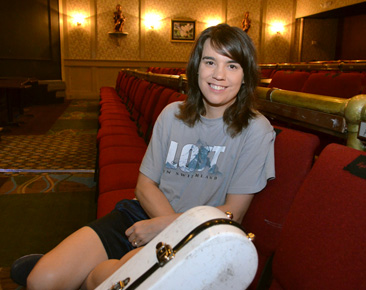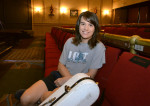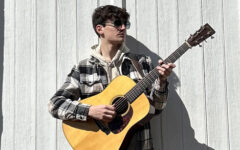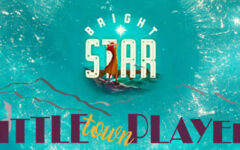
 Banjos are big these days, as evidenced by Mumford and Sons’ Grammy for album of the year, and a recent flurry of activity for traditional bluegrass band The Grascals, including a Grammy nomination of their own, and an appearance on Jay Leno.
Banjos are big these days, as evidenced by Mumford and Sons’ Grammy for album of the year, and a recent flurry of activity for traditional bluegrass band The Grascals, including a Grammy nomination of their own, and an appearance on Jay Leno.
Some within the music community sense friction between the growing popularity of bluegrass and the use of traditional string instruments and themes by pop, county, and alternative rock artists. But not everyone agrees.
Grascal of five years Kristin Scott Benson, four time IBMA Banjo Player of the Year, at 38 is a 20-year veteran of bluegrass bands. She’s proud for the success of Mumford and Sons and celebrates all styles of music, but especially string instruments.
The music of Mumford and Sons “is very different than ours,” she said. “There is a jam band scene and more of a traditional bluegrass scene, which is where we are. I mean it’s pretty remarkable that they’ve won album of the year. It’s amazing to me.’
“It won’t hurt us. We just do what we do and it’s a very traditional form of bluegrass. It’s a lot different than Mumford and Sons or the Avett Brothers. There’s a whole scene (with those bands) and a gigantic audience.’
Grabbing a share of that growing audience is not as easy as one would think, she said.
“It would be nice if we could intertwine those two some but it’s not easy to do. From a business standpoint it’s not easy to do because the audience is so separate. We just played Palatka Florida, and I can assure you no one in that place have ever been to one of those shows.
I think their audiences would be more receptive to new things and be open-minded.”
And that acceptance, or lack thereof, remains at the heart of the challenge faced by all bluegrass musicians and fans as they continue the tradition of excellence in performance and innovations in musicianship within traditional instrumentation, she said.
“It’s a double-edged sword. Traditional bluegrass has always to the ‘coolest of the cool’ had a stigma attached to it as hillbilly and backwoods. Even as a kid growing up, loving bluegrass and the banjo, of course you feel that.”
Benson also feels the popularity of the new styles, including an enthusiastic response to banjo playing. But it may not be a two-way street, she said.
“Interestingly, and I think the jam band scene’s audience would personify this well, they seem to be very open minded. If they like it they like, it and they don’t care what it is.
On our own side of the fence, we can have audience members that are very close minded, ironically, because the only music they want to hear is traditional bluegrass.”
It can work both directions.
“It’s weird because mainstream audiences have to be open minded to hear our music, like it and accept it–and admit that they like it. That requires an open mind. At the same time, our audience, a lot of them, could benefit from being more open minded to the other side.”
The Grascals keep the traditional style of bluegrass alive and along the way share a old-time concept for musicians in a successful band: they like each other, she said.
“We stay really busy and we’re together a lot. I think my favorite thing about this band is how everybody gets along. The quality and the time you spend with people matters a great deal. It’s like any other job: a million factors go in to make it what it is. I’ve had a great five years here.
Another great thing about this job is we’re all on the same page. Everybody is attached. Nobody is overly young. Our youngest member is the fiddle player and he’s in his 30s like me. You kind of all need to be on the same page, the same season of life. We’re all quite content to stay around that 100 [dates a year] mark.
Thankfully, bluegrass bands typically can be classified as sort of what you call weekend warriors. Four of us have kids. I have a six-year-old boy. It works great because we’re home all week and we play on the weekends.”
It’s a living but Benson shares a passion for performance with other elite players, as well as kids just starting out and experiencing banjo playing for the first time.
“I just feel like there’s no other genre. At a festival, it’s not unusual for you to speak to 100 people that you kind of know. The lines are blurred between the bands and the listeners and it makes for a really special, unique experience to be a bluegrass musician. It’s just the finest group of people you could every play for.
“In fact you could even go further and say that our industry is comprised mostly of that. You look at the vast majority of promoters, they’re not professional music promoters. It’s a labor of love. JT (event promoter J.T. Shealy) is a perfect example of this.
Shealy had the Grascals booked for six months when I visited at their show in Mims, FL, and can’t help but smile when thinking about all the recent publicity from the Leno appearance.
“I had them here last year too. We have two or three big bands in here each year and they are probably one of the best. This is top drawer,’’ Shealy said.
Benson can‘t say enough about those who help promote bluegrass and The Grascals.
“Whether it’s a promoter or a radio DJ that has a show on from 6 a.m. to 10 using is own private collection. It’s absolutely a grass roots, salt of the earth special community that you won’t find in any other genre of music.”
Bluegrassers often experiment with other styles of music, but Benson said it’s no surprise that many eventually come back to their roots.
“A lot of times it goes back to who you are and what you did first. You can do that as an adult. You can do all those different things and kind of morph your musicianship, but there really is an element of ‘who are you?’ and ‘where did you come from?’ And what meant everything to you musically when you were 15 years old?
It’s never going to go away and that’s at the core of your musical self. Even as a professional musician, you can never re-create that feeling you get as a teenager that captivates you and sets you on the path. Even if you’re not a musician, if music just meant that much to you as a listener, if it ever grabs you in those formative years, what you are during that time will always be there. It’s a well that you can always return to.”
Bluegrass is a traditional form of music but remains fresh because it celebrates innovations, Benson said.
“It’s important to look at the evolution of bluegrass and realize that there have always been those innovators. What the Osborne Brothers did in the 70s was crazy out of the box. There are just so many (innovators) that you could just look down the line and look at how it’s evolved and how it’s changed.
One cool part of bluegrass is we do still have the purists that maintain the tradition and that’s the legs that everyone stands on.”
You can keep up with Kristin and the Grascals online.







